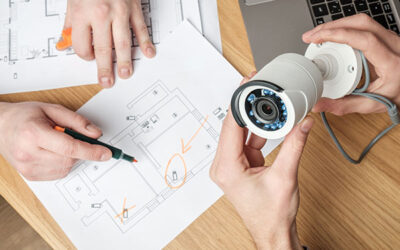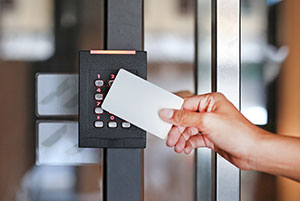With all the jargon surrounding security cameras, choosing the right type for your home or business can be confusing. One of the most fundamental choices you’ll have to make – and one that most confuses consumers is whether to choose an IP camera or a CCTV camera.
Well, it’s time to cast the confusion aside, as we’re here to help. In this post, we detail what both IP cameras and CCTV cameras are, the differences between the two, and how to decide which is best for you.
What Is the Difference Between an IP Camera And a CCTV Camera?
Let’s start by defining what both an IP camera and a CCTV camera are and looking at the differences between the two.
An IP, or internet protocol, camera, is a security camera that transmits footage over the internet via Ethernet (Cat 5e or Cat 6) cables. IP cameras work by converting the captured video footage into data packets and transmitting them over the internet. From there, the footage is broadcast on a live feed and stored on a network video recorder (NVR), network-attached storage (NAS), in cloud-hosted storage or directly onto the camera. Plus, because Ethernet cables utilise power over internet PoE to provide a direct current to devices on a network, IP cameras don’t need power cables as CCTV cameras do.
Conversely, CCTV (closed-circuit television) transmits footage using an analogue coaxial cable. From there, it is stored on a digital video recorder (DVR) and transferred onto monitors where it’s viewed by the end user. Additionally, CCTV security systems require power cables to provide electricity to the security cameras. However, while the term CCTV camera usually refers to old school analogue cameras, a lot of them have been replaced by newer, HD security cameras and are still seen in the field.
While IP cameras are more advanced than CCTV cameras, CCTV is still commonly used as the existing coaxial cable and power is in place. As a result, CCTV cameras are most often still seen in commercial settings. There are new recorders that now accommodate existing CCTV (coaxial cable) cameras and new IP cameras (Cat5 or Cat 6 cable)
Because IP cameras can be installed on an existing home or office network, they’re very versatile. They are the preferred technology for new business sites and home security.
What Are the Advantages of IP Cameras?
Now that we understand the difference between IP cameras and CCTV cameras, let’s look at the benefits of each, starting with the advantages of IP cameras.
Functionality
IP cameras are more functional, capable, and technologically advanced than CCTV cameras. As a result, they outperform them in several areas.
Resolution: for a start, IP cameras generally have a much higher resolution than CCTV cameras. Their higher resolution allows for a much larger field of view compared to analogue CCTV cameras. This means you get to reduce the number of cameras required to survey a particular area. Put another way, positioned correctly, a high-resolution IP camera can handle the work of several CCTV cameras.
Features: as the newer of the two security cameras, IP cameras are more technologically advanced. This can include an onboard processor that gives them more capabilities than analogue CCTV cameras. These features include motion detection, wide dynamic range, and improved low light functionality.
Zoom:Digital zoom is another common feature of IP cameras that isn’t available on many CCTV cameras. This allows the person monitoring the footage, whether live or recorded, to zoom into people and objects to examine them in greater detail. Plus, the higher the resolution of the image, the more pixels it has and the closer you can zoom in before the image starts to blur. This is especially useful when trying to read a vehicle’s license plate or identify a face, for instance.
Frame Rate: Another factor in your decision is the frame rate of the camera. The frame rate determines how well you see fast-moving objects without the image blurring or becoming choppy. In short, the higher the security camera’s frame rate, measured in frames per second (fps), the smoother the footage will be. The frame rate of security cameras matters if you need to record fast-moving objects, like vehicles, in as much detail as possible.
Now, that’s not to say that no CCTV cameras have this capability, as some of the newer digital CCTV cameras do. However, they haven’t reached the heights of IP cameras – especially those used in intelligent video surveillance (IVS) systems.
Cost
Cost is an interesting consideration, because the case can be made for both IP and CCTV cameras being more cost-effective.
On one hand, analogue CCTV cameras are cheaper than digital IP cameras – particularly high-resolution models and those with lots of features. However, the declining price of tech used in IP security camera systems is closing the gap. Also, because you can install IP cameras within your existing network, and cabling infrastructure of CAT5 or CAT6, you won’t have to fork out for the, often considerable, cost of installing the cabling required for CCTV security cameras.
In addition, as touched on above, IP cameras can reach higher resolutions than CCTV cameras. So, you can survey areas with fewer cameras which reduces the overall cost of your security system.
Accessibility
Because IP cameras are constantly connected to the internet, you can view the footage they capture from anywhere with a remote viewing function. Now, while this is possible with newer CCTV cameras, it’s a standard feature on IP cameras. Better still, it’s easier to send the footage to anyone who might need it. Crucially, this reduces the time it takes to investigate an incident in the event of one taking place.
Scalability
Another notable benefit of IP cameras is that it’s easier to add more to your security system. In the case of CCTV, the footage is recorded onto a DVR in a CCTV system. However, most DVRs have a limit, which is usually 4, 8, 16, or 32 cameras. After that, you’ll have to purchase another DVR and integrate it into your security system.
With IP cameras, whilst the NVR machines also come in 4,8,16,32 channels, you can purchase a server with various levels of camera and hard drive space and run 64, 100+ cameras on the one machine. Some systems charge a license fee per camera when adding to the system and some do not. You will need to add more hard drives when adding more cameras to an IP server system for the additional recording time.
What Are the Advantages of CCTV Cameras?
Though IP cameras are the more technologically advanced of the two, CCTV cameras may still be preferable in certain situations. Let’s go over the advantages of CCTV cameras.
Cost
Now, as we mentioned above, depending on your situation and security needs, IP cameras or CCTV cameras could be better for you pricewise.
Firstly, analogue CCTV cameras are often cheaper than IP cameras. However, as mentioned above, the fact you can cover a larger area with an IP camera can cancel this out. That being said, CCTV might still prove to be cost-effective if you have a small property that only needs 1 or 2 cameras.
However, where CCTV really becomes cost-effective – and the main reason to consider installing CCTV cameras over IP cameras- is if you have already existing infrastructure, i.e., coaxial cables, in place. This might be a position you find yourself in if you move into a new commercial building that had a comprehensive CCTV security system in place. If this is the case, you save on the cost, and time, of having the cables installed for you. All that’s left for you to do is to install up to date security components. CCTV analogue now comes in HD and can provide decent images.
Simplicity
Although they’re harder components to install, CCTV security cameras are usually simpler to operate. Firstly, because they send footage to a DVR and a screen for monitoring, they’re easier to configure and maintain. As a CCTV security system runs on a closed-circuit system it doesn’t access cloud storage, or any other private wireless network. Some of the latest machines however do accommodate both HD Analogue, analogue and IP cameras and can be networked.
Secondly, as CCTV tend to not have the playback bells and whistles, like digital zoom, facial recognition, etc., that IP cameras do, they’re a simple option. This means there’s less of a learning curve when getting to grips with a CCTV security system and a reduced chance of human error.
Which Are Better: IP Cameras Or CCTV Cameras?
So, now you know the benefits of CCTV and IP cameras – the question is, which one is better? Well, in short, the answer depends on you and what you need from your security cameras. Here are a few things that determine whether a CCTV camera or an IP camera will be better for you.
Summary
In summary, IP cameras are the more technologically advanced of the two types of security cameras. And while IP cameras have higher initial price points, you can install them on an existing network. CCTV cameras, in contrast, may cost less upfront but the overall cost of your security system grows when you factor in all the cabling. That being said, if your building already has the required cabling, you may be better off going with CCTV over IP cameras.
Now, if you’re still in two minds about which type of security camera best suits you, get in touch and we’ll be happy to advise you. Better still, we can carry out a free onsite inspection of your property to help you decide whether to opt for IP or CCTV cameras.




